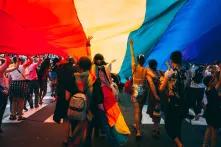
Zionist Aspirations
The Israeli state is increasingly embracing far-right politics, rendering the lives of marginalized Jewish populations within its society, as well as Palestinians, ever more precarious. Discourses surrounding gender and sexuality undergird Israel’s regressive policies. Forces that promote women’s and queer rights in Israel, in tension with forces promoting misogyny and homophobia, have all contributed to the far-right contemporary Israeli political landscape. There are contradictions between the image Israel is keen to project to the world of its liberal progressive democracy, and the realities of its entrenched racism, gender-based discrimination, and homophobia.
Fundamental contradictions at the heart of Zionism have defined Israel since its establishment through to the present. Indicative are three ongoing struggles. The first is the push and pull between secular and religious forces. Second, the competing forces of democratic and ultra-nationalist values. Finally, there are tensions between progressive and liberal voices that advocate for women’s and queer rights on one hand, and Orthodox and ultra-Orthodox lobbying for conservative, misogynist, and homophobic structures on the other hand.
Despite formidable achievements related to feminist and LGBTQ rights in the cultural, social, political, and legislative realms, the Rabbinic Court’s hold on family law, marriage, and divorce has largely hampered sustainable structural change towards equality with regard to gender and sexual orientation. While progressive forces contribute to the projection internationally of an image of Israel championing liberal democratic Western values, internally, the social and legal authority of Israel’s Orthodox and ultra-Orthodox populations reinforce sexism and homophobia. This political landscape offers little room for women, queers, Palestinians, or other marginalized groups in Israel/Palestine. And with discourses on gender and sexuality at their foundation, Israel’s far-right politics continue to rise.
One of the early goals of Zionism was to instill ultra-masculine traits in Jewish men. When Zionist leader Max Nordau spoke in 1898 at the Second Zionist Congress in Basel, he called upon participants to shape a “muscular Judaism” (Muskeljudentum). This muscular Judaism, which gave birth to the image of the “new Jew,” stood in stark contrast to the perception of the weak and passive Diaspora Jew.
Demographic Panic
Closely linked to the concept of political Zionism, particularly to its central objective of creating/sustaining a Jewish state, is the question of demography. Following the founding of Israel, one of the principle goals was to attract as many Jews as possible to establish a Jewish majority. This policy was circumscribed in the 1948 Proclamation of Independence and enacted in the 1950 Law of Return. Described as the cornerstone of the Israeli raison d’être, or as a purely ethnocentric law, this stipulation provides a legal justification for restricting immigration into Israel exclusively to people of Jewish origin. Additional measures taken by the Israeli government to counter what has been described as a “demographic threat” or “demographic panic”—referencing the fear of losing the Jewish majority in Israel and, with that, the Zionist character of the state—include various immigration policies, the control of residential patterns of ethnic groups and geographic population distributions, and, finally, investment in fertility treatment for Jewish women. It should perhaps not come as a surprise that Israeli society has the highest rates of Assisted Reproductive Technologies (ART) interventions in the world, as well as the highest per capita consumption rate of infertility therapy. As Prime Minister Ehud Barak succinctly remarked in July 2000, demography is an “existential” question.
The lack of a formal separation between religion and state has placed family law, and thus the governance of gender norms, under the control of the Orthodox rabbinate. While nearly half of Israel’s Jewish population defines itself as secular, and only about 20 percent as Orthodox or ultra-Orthodox, family law, and thus the politics of sexuality and reproduction, is based upon the precepts of this religious minority. In this regard, the 1953 Rabbinical Courts Jurisdiction Law, which stipulates that marriage and divorce of the country’s Jewish population can only be conducted according to Jewish Orthodox law, is fundamental. It precludes any possibility of inter-religious marriage in Israel, prohibiting both Jewish women and men from marrying and have “legally Jewish children” with non-Jews. The Orthodox control of Israeli family law and personal status regulations has significant consequences for women and queers, discriminating against them in various ways.
Israeli academic and politician Susan Hattis Rolef has written on the “perversions caused by inherent clashes between the Law of Return and the civil rights bestowed on, or denied to those who become Israeli citizens on its basis.” An example of this clash is the case of 24-year-old Artem Dolgopayat, who recently won a gold medal at the Olympics for his floor exercise in gymnastics. Dolgopayat immigrated to Israel from Ukraine in 2009 and received citizenship on the grounds that his father’s mother was Jewish. But, since his mother is not Jewish, he is not formally recognized as Jewish. Despite being celebrated as a national hero, he cannot marry his non-Jewish girlfriend of three years in Israel.
As Israeli researcher Zvi Triger has speculated, the majority of Israeli Jews may not want to change the system because they believe that “the religion-nation nexus is too important and that, despite their own secularism, Orthodox Judaism has come to be a natural and taken-for-granted component of the Jewish-Israeli identity.” According to a 2011 survey, only 44 percent of Israeli Jews believe that, in the case of a conflict, democracy should override Judaism. According to the same source, only 51 percent of Israeli Jews support civil marriage, while 80 percent stated that “it is ‘important’ or ‘very important’ to be married by a rabbi.”
Women in Israel, as the bearers of national identity, have not been able to fundamentally challenge the male monopoly on a system in which female bodies and reproductive lives are overseen, and indeed controlled, by a framework that is anchored in rulings established nearly two thousand years ago. Men have done even less to call for change. Some do critique and even fight various problems related to Israel’s religious patriarchal rulings. While often impactful in their gender politics, they are limited by the larger political structure built on the unbridgeable gap between democracy and the ideology of maintaining a Jewish state.
Anti-democratic forces
This gap between democracy and Zionism plays itself out in the current political climate, specifically in the context of recent elections and the related complexity of forming alliances and coalitions. The struggle is between progressive forces that advocate Western values, and radical right-wing voices that promote ultra-conservative and openly homophobic and anti-feminist policies. The Israeli state largely showcases the former to international media and diplomacy platforms, to whom it plays down the latter, implying that they are marginal groups or organizations with little or no impact on Israeli legislation. Yet, the power and influence of such voices on policies should not be underestimated.
Among the most outspokenly prejudiced against queers and feminist individuals and groups are the current Knesset members Bezalel Smotrich and Avigdor Maoz of the Religious Zionist Party. From his early days as a young activist, 41-year-old Smotrich proclaimed he was a “proud homophobe”, and he is known for having initiated the “Beast Parade,” an anti-gay demonstration in Jerusalem in 2006. Avigdor Maoz established the Noam party in 2019, promoting its homophobic views on billboards and in video adverts with the slogan “Israel chooses to be normal.” According to his party, the LGBTQ community is imposing its agenda on the rest of Israeli society, which naturally believes in a “normal” (heteronormative) family structure. One of these promotional videos likened Reform Jews, left-wing activists, and gay rights advocates to Nazis and Palestinian suicide bombers, stating that they are all out to “destroy us.” The party is ideologically supported by Rabbi Tzvi Tau, the co-founder and president of Yeshivat Har Hamor in a Jerusalem settlement. The 81-year-old is one of the most important religious figures to denounce acceptance of the LGBTQ community in Israel. In 2017, he was quoted as describing homosexuality as the “ugliest deviation, which breaks down family life […] and contradicts the first basis of human existence.” He also expressed his view that the greatest achievement women can strive to attain in life is to get married and have children. In Makor Rishon, an Israeli newspaper associated with religious Zionism and the conservative right-wing, Maoz is quoted asserting “The State of Israel is first and foremost Jewish and only afterward democratic.” Yet Smotrich and Maoz have reached the highest levels of power in Israel’s democratically-elected government, giving their followers increased prominence, legitimacy, and access to visible platforms. Whether formidable resistance to the forces of ultra-right-wing politics, racism, sexism, and homophobia will ultimately prevail, only time can tell.


